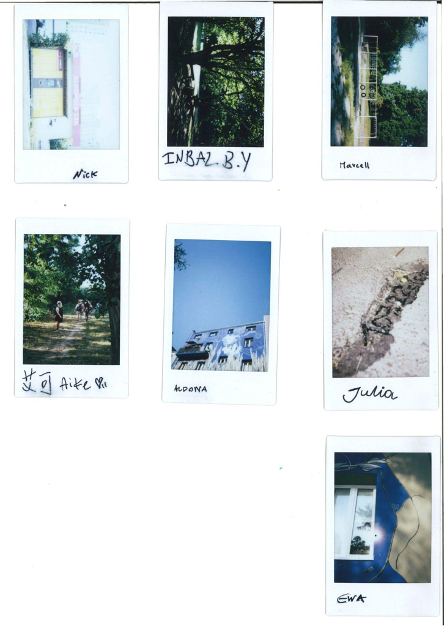
Polaroid pictures from the Friday field walk.
Report: SIEF Summer School 2022
Report of the SIEF Summer School 2022 ‘Urban Heritage on the Right Bank. Heritage in Warsaw as Seen from the Praga District'.
The SIEF Summer Schools programme has already for a decade been gathering graduate students of ethnology, cultural anthropology and folklore in order to provide them with an opportunity to broaden their academic perspectives and facilitate building transnational links at the early stage of their professional career. The Summer School 2022, entitled “Urban Heritage on the Right Bank. Heritage in Warsaw as Seen from the Praga District” was hosted by the Institute of Ethnology and Cultural Anthropology of the University of Warsaw and attended by 15 graduate students from several countries of Europe, as well as China, Israel and the USA.
Most Summer School activities, though, did not take place in the University’s premises located on the left bank of the Vistula river, but in Praga, the right-bank eastern district of the city. The Summer School looked at urban heritage, craft, and issues of regeneration and gentrification with a focus on the right-bank district.
The activities comprised lectured and group workshop discussions, along with walking field workshops and study visits to the Museum of Warsaw, Museum Polin, Museum of Warsaw Praga, and meetings with local heritage activists and officials. During the fieldwalk in the Grochów neighbourhood one of the participants, Marit van Dijk from Amsterdam, asked all the group members to take pictures with her polaroid (an experience for all those who had never tried Polaroid before): below are the pictures and some impressions the participants wished to share with the SIEF Newsletter readers:
Katarzyna Łatała (University of Warsaw, Ludwig Maximilians University of Munich)
What I found the most inspiring for my research at the summer school were the keynote lectures of Professor Regina Bendix and Professor Nevena Škribić-Alempijević. Each of them presented their own research, investigating how communities shape their futures. They took perspectives that engage in the changing world which I consider to be crucial in times of crises.
I appreciate that I had an opportunity to listen and learn about the research of other young scholars and share my own academic and personal experiences. Our group was diverse both in terms of research methodology and interests, as well as the countries of origin and residence which made the exchange particularly interesting.
Nicholas Booker (The Ohio State University)
The most generative aspect of the summer school in my mind was the careful combination of lectures, field walks, and discussions. Dr. Michał Murawski’s lecture about colonial and decolonial efforts relating to socialist realism was informative, but it was made all the more impactful when we were able to discuss examples of socialist realism with scholars and community members during field walks. My background is in music scholarship in the United States, and I was interested to learn about how scholars from various disciplinary backgrounds were working with culture and identity in their research in other parts of the world.
Áron Bakos (Babeș-Bolyai University)
Listening to Intriguing lectures, participating in vivid conversations, visiting engaging exhibitions, discovering a lovely city, drinking some superb beers, having much-needed ice-creams, a heroic melt in the summer sun paired with learning difficult histories, recognising the fingerprints of the Second World War and a totalitarian rule on the cityscape, facing the dark heritage of the Shoah in the museums, and being emotionally and intellectually challenged to comprehend and research a controversial past and an unforeseeable future. For me, that was the summer school in a cone.
Marit van Dijk (Reinwardt Academie, Amsterdam University of the Arts)
It was great to learn in an interdisciplinary and international setting. The many different topics that touch upon the history of Praga were echoed in the lectures, city walks, museums and in the research of the participants. This all allowed for a rather unique and comfortable learning environment.
Lauren Hossack (Elphinstone Institute, University of Aberdeen)
The keynote speakers, walk leaders and practitioners we met provided tools for engaging with the multilayered hidden histories and ambivalent legacies encountered on the streets of Warsaw. I enjoyed putting method into practice through daily fieldwalks, which gave space for conversations and connections that will (hopefully!) continue long after the week spent together.
We are very happy to announce that the next SIEF Summer School will take place in Croatia in 2024!




